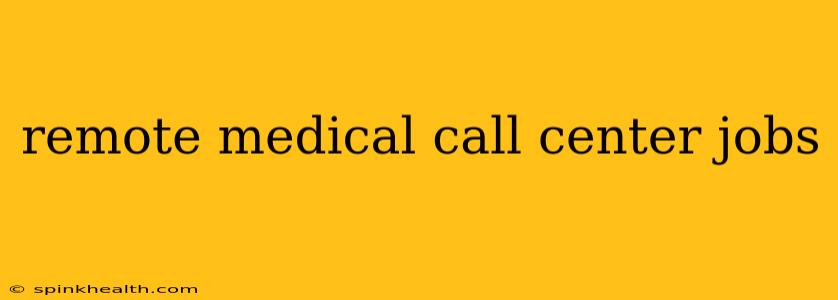The hum of a busy call center, the satisfying click of a keyboard, the rewarding feeling of helping someone in need – all from the comfort of your home. That's the reality for many who work remote medical call center jobs. This isn't just about answering phones; it's about providing crucial support, offering empathy, and often making a real difference in people's lives. But what exactly does it entail, and is it the right career path for you? Let's dive in.
What Does a Remote Medical Call Center Job Involve?
Imagine this: you're sitting at your home desk, a warm cup of coffee nearby, ready to tackle your workday. Your tasks might include:
- Answering incoming calls: Patients might be calling to schedule appointments, refill prescriptions, ask about their test results, or seek general medical advice (depending on the specific role).
- Scheduling appointments: Coordinating patient schedules with doctors, nurses, and other medical professionals.
- Entering patient information: Accurately and efficiently recording data into electronic health records (EHRs).
- Handling insurance verification: Navigating insurance complexities to ensure patients receive the appropriate coverage.
- Providing general medical information: Answering basic health questions, directing patients to appropriate resources, and following established protocols.
- Triaging calls: Determining the urgency of calls and prioritizing those requiring immediate attention. This might involve escalating critical situations to appropriate medical personnel.
What are the Benefits of Working in a Remote Medical Call Center?
The advantages are numerous, drawing in individuals seeking flexibility and a purpose-driven career:
- Flexibility: Work from home, set your own hours (often within a specific timeframe), and enjoy a better work-life balance.
- Remote Work: No daily commute, saving time and money.
- Making a Difference: Knowing you're contributing to a crucial healthcare system and helping people directly.
- Growth Potential: Opportunities for advancement within the company, including roles with increased responsibility and compensation.
- Competitive Salary: Many remote medical call center jobs offer competitive salaries and benefits packages, including health insurance and paid time off.
What Skills and Qualifications Do I Need?
While specific requirements vary depending on the employer and role, some common skills and qualifications are essential:
- Excellent Communication Skills: The ability to communicate clearly and empathetically, both verbally and in writing, is critical.
- Medical Terminology Knowledge: Familiarity with medical terms and procedures will make you more efficient and effective.
- Computer Skills: Proficiency in using computers and various software programs, including EHR systems.
- Typing Skills: Accurate and fast typing is essential for efficient data entry.
- Attention to Detail: Accuracy is paramount in handling patient information and medical records.
- Problem-Solving Skills: The ability to quickly assess situations and find solutions, especially during stressful situations.
- Empathy and Patience: Working with patients who may be anxious or stressed requires patience and a compassionate approach.
How Can I Find Remote Medical Call Center Jobs?
The search for your ideal role can begin in several ways:
- Online Job Boards: Websites like Indeed, LinkedIn, Monster, and CareerBuilder often list remote medical call center openings.
- Company Websites: Check the career pages of major healthcare providers and medical billing companies.
- Networking: Connecting with people in the healthcare industry can lead to valuable leads and opportunities.
- Professional Organizations: Joining relevant professional associations can provide access to job boards and networking events.
What are the Challenges of Working in a Remote Medical Call Center?
While the advantages are compelling, it's important to acknowledge potential challenges:
- Isolation: Working from home can lead to feelings of isolation if not managed effectively.
- Technology Issues: Technical problems with your equipment or internet connection can disrupt workflow.
- Maintaining Confidentiality: Strict adherence to HIPAA regulations and maintaining patient confidentiality is crucial.
- Emotional Toll: Handling stressful calls and sensitive patient information can be emotionally demanding.
What is the salary range for remote medical call center jobs?
Salaries vary significantly based on location, experience, and the specific responsibilities of the role. Entry-level positions might offer lower pay, while more senior roles or those requiring specialized skills can command higher salaries. Researching specific job postings will provide a clearer understanding of salary ranges within your area.
Is it difficult to get a remote medical call center job?
The competitiveness of the job market varies, but in general, securing a remote medical call center job requires a combination of the right skills, experience, and a well-crafted application. Highlighting relevant skills and experience in your resume and cover letter, and showcasing strong communication and problem-solving abilities, is key to standing out among applicants.
This journey into the world of remote medical call center jobs showcases the balance of fulfilling work and the flexibility many crave. Remember to research thoroughly, tailor your applications, and highlight your skills to land your dream role. The path to a rewarding career from home starts with a single click – and a determined spirit.

